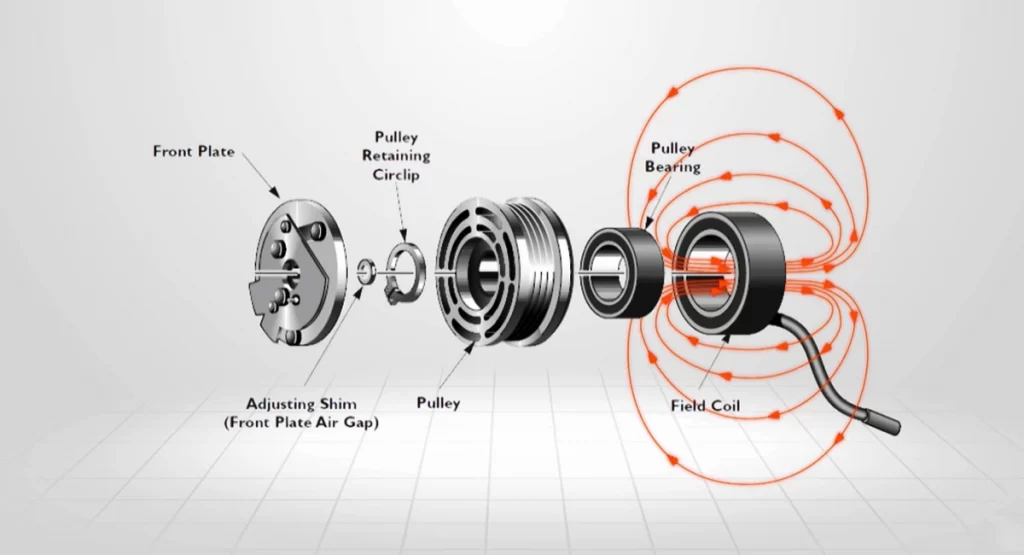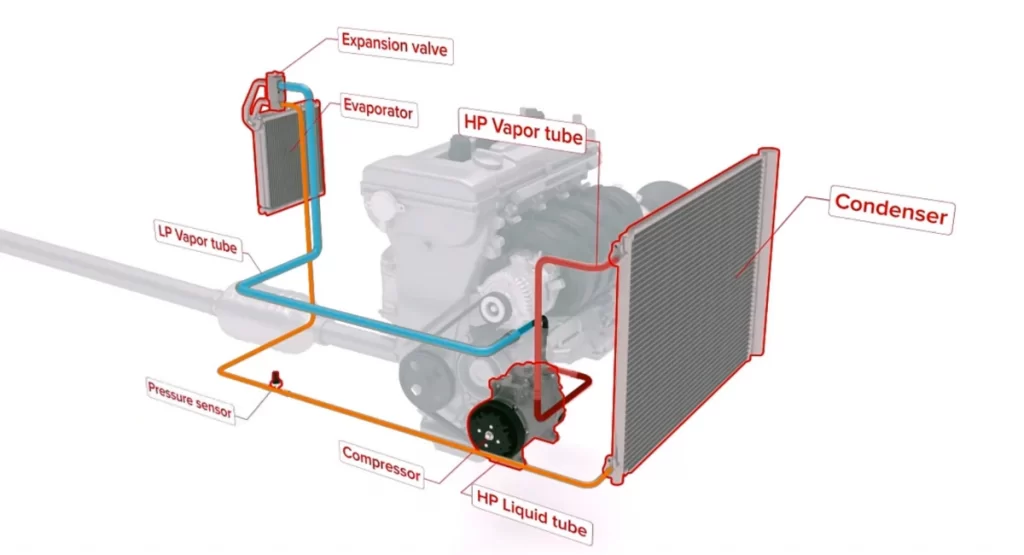Short cycling is a serious problem with air conditioning that occurs when the compressor clutch constantly turns on and off. Short cycling [AC Clutch Engages intermittently] can be caused by a variety of factors, including,
- An obstructed or faulty thermostat,
- leaking refrigerant,
- icy coils, and
- an overly large HVAC system.
A blown or faulty fuse is another factor that could cause an air conditioner compressor clutch to stop engaging. Naked wires to the
- clutch coil,
- a faulty clutch coil,
- low-pressure lockout, and
- poor ground are also factors.
Furthermore, some vehicles engage and disengage repeatedly due to faulty evaporator temperature sensors and low-pressure switches.
In this article we mainly discuss the “AC clutch engages intermittently.” problem and include almost everything you need to know. So welcome, It Is My Car.
How does the vehicle’s AC compressor clutch work and how AC Clutch Engages Intermittently?
A belt drive connected to the engine spins continuously, supplying energy to the AC compressor. The belt turns a rotor, which is attached to a friction plate.
An electromagnet—a wire coil that produces a magnetic field when current is passed through it—is located near the rotor. Another friction plate is attached to the rotor that powers the air conditioner across from the friction plate.
When the electromagnet is turned on, it generates a strong magnetic field that passes through the rotor. Because both the fan belt rotor and the air conditioner rotor are made of iron, the magnetic field magnetizes them and pulls them towards each other.
This causes the friction plates to push together tightly. The rotor friction plate is initially turning while the compressor friction plate is not. However, once they are in contact, friction between the two plates causes the air conditioner rotor to spin.
When the electromagnet is turned off, the friction plates separate and the compressor comes to a halt.
What controls the AC compressor clutch?
When the clutch is engaged in a traditional mobile air-conditioning system, the compressor runs at full capacity. The compressor in a “all-or-nothing” system architecture cycles on and off as needed to circulate the coolant and lubricant through the system.

Switches, relays, and transducers regulate the clutch (and hence the compressor), keeping the system running smoothly and, in the event of a failure, shutting down the compressor to avoid catastrophic failure.
How often should a car’s AC clutch engage?
Vehicle air conditioners cycle every 15 to 20 minutes when everything is working properly. This varies depending on the car model and compressor model, but when the outside temperature is high, the system must work harder to compensate.
Is it normal for my AC compressor to cycle on and off?
Short cycling occurs when an air conditioner (AC) goes on and off in rapid succession without running for extended periods of time. It’s very common, but when it occurs, it indicates that something is wrong with the AC. Do not ignore these events.
What are the car’s AC compressor failure symptoms?
Identifying indications of a faulty air conditioner in a car is not as tough as it may appear. In fact, identifying defective ac compressor indications is simple and straightforward. When you have a bad ac compressor, some symptoms will appear.
Keeping an eye out for these indications will help you diagnose and replace your AC compressor, saving you money on repairs.
Broken Suction Lines.
When your vehicle’s ac compressor fails or is damaged, the refrigerant line might become clogged, resulting in hot airflow out your air vent.
Unblocking refrigerant lines requires the assistance of an HVAC expert, or you may elect to replace the lines if you trust your instincts.
Leaks of fluid.
As previously stated, your vehicle’s air-conditioning compressor includes internal bearings that prevent refrigerant from leaking out of the compressor.
The compressor’s job is to pressurize the refrigerant, which aids in cooling.
Circuit breaker trip.
If the outside condensing unit on your car continues to trip the circuit, it signals a faulty or failing ac compressor.
This is due to the compressor overheating and using a lot of power, triggering the circuit breaker. If you observe your circuit breaker tripping, stop resetting it and turn on the system.
Clutch is stuck.
The AC compressor, like a manual transmission, includes a clutch. This clutch links to the engine of your car to pull power from it.
The compressor only utilizes power when it is required. However, if the AC compressor clutch or pulley becomes stuck, the compressor will not function since it will not receive power.
High temperature in the cabin:
When your dashboard AC vent no longer sends cold air inside the car, this is one of the first symptoms that your AC compressor has failed.
A failed or faulty air conditioning compressor will not circulate refrigerant in the air conditioning system, resulting in heated air entering through the AC vents.
As a result, if the AC compressor malfunctions, you may experience high temperatures and heated airflow within the vehicle.
Will a bad AC compressor affect the engine?
A faulty compressor could harm your car’s engine. If the pulley bearing on your compressor fails, your engine may stall due to the stuck compressor, or the serpentine belt may break, damaging all the accessories moved by the serpentine belt.
If the ac compressor fails, it will have an impact on the engine because when the compressor’s pulley bearing fails, the engine will stall owing to the stalled compressor. Furthermore, the serpentine belt may break, affecting all other accessories that it moves.
Can a bad AC compressor cause engine vibration?
The compressor cools the refrigerant before it is supplied to the condenser. As a result, if your air conditioner compressor malfunctions, it can put a strain on your engine and eventually cause your car to shake when stopped and the air conditioner is turned on.
Excessive drag can be caused by an engine idling for an extended period of time. Vibration when idling causes the engine to stall.

In a car with power steering, too much drag while the A/C is on may cause more engine stalling and more steering wheel shaking.
Accelerate the automobile while the air conditioner is on to diagnose the problem. If you notice a difference in pick, it’s time to replace the AC.
Why does the brake pedal vibrate when the AC is on?
If you’ve been experiencing unusual engine vibrations or shaking while using your air conditioner, the issue could be with the engine mounts.
If these are broken, misplaced, or worn out, they can put strain on the unit and cause it to tremble when the air conditioner is turned on.
We hope you’ve got the answer that you’ve needed for the question, “AC Clutch Engages Intermittently” reading our explanation. If you have more questions just leave a comment below, and we are really straightforward to help you further. If you need answers or knowledge about the Active Fuel Management, check this link for it. Thank you.
